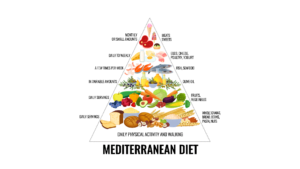A healthy diet plays an essential role in promoting female hormonal health, and yet the word ‘diet’ has the power to send our heads into a spin. Still, eating healthy can be a great experience – enjoying delicious foods that are inexpensive and easy to prepare, without strict calorie counting. Small changes here and there can go a long way with easing your symptoms, leaving you to feel your happy, relaxed, energetic self again.
Health experts worldwide continue to praise the Mediterranean Diet (MD) as the #1 diet for good health and longevity. The MD has many health benefits including cancer prevention, good heart and brain health and weight loss, but what’s less known is its therapeutic effects on female hormonal irregularities and disease. Studies show the high antioxidant and anti-inflammatory nutrients contained in the Mediterranean Diet is why it’s beneficial for managing and preventing chronic conditions.
The Mediterranean Diet is based on fresh, whole foods and is primarily plant based including vegetables, fruit, legumes, nuts, seeds, healthy fats (olive oil and avocado), with a little fish, seafood and meats. The main drink in the MD is water in which drinking 1.5 – 2 litres of filtered water daily is recommended.

Our main aim when supporting healthy hormones with women, especially peri-menopausal women, is to ensure we are making and clearing adequate oestrogen, that it is balanced with progesterone and that it is clearing correctly from the body. Many hormonal issues can be from poor oestrogen clearance and an imbalance of the ratio between progesterone and oestrogen.
There are two ways we move oestrogen from our bodies. The first step occurs in the liver and the second step occurs in our bowel. The health of both of these organs is vital to healthy oestrogen clearance. Ensuring we are having a regular bowel movement everyday is important for healthy hormones.
Reducing alcohol is really important as part of supporting hormone balance. Just 2 drinks a day can double your exposure to oestrogen.
The gut microbiome is the community of bacteria, fungi and other organisms that are living along our digestive tract, especially in our large intestine. A diverse and healthy gut microbiome has many impacts on the body including our ability to absorb nutrients, our mental health and our ability to detoxify our hormones, especially our oestrogen.
It’s important to feed the gut microbiome with berries, fibre foods, linseed meal, psyllium husk, whole grains, green leafy vegetables, and fermented foods and consider taking a probiotic. 2 teaspoons of linseed meal daily is excellent for hormonal balance for women. These provide omega 3 fatty acids, aid clearance of oestrogen from the body and are an excellent fibre source. Ultra processed foods, high sugar intake, alcohol, trans fats from oils such as margarine, and fried foods can impact on the health of the gut microbiome, which can impact on hormone health.
Potent foods for optimising hormones:
- Protein with each main meal. Aim for a palm size portion with each main meal. Protein is found in meat, nuts, seeds, eggs, hommus, yoghurt, tofu, beans. It is critical for many reasons including balancing blood sugar to help reduce sugar cravings, supporting happy brain chemistry production and also maintaining muscle mass.
- Include some good fats in your diet such as avocado, nuts, seeds, olive oil and fish. Good fats help support a healthy heart, brain and hormones.
- Selenium rich foods- brazil nuts, organ meats, seafood, salmon.
- Phyto-estrogens-these are beneficial as they weakly bind to your oestrogen receptor sites and help to buffer you from the ups and downs of stronger oestrogens (known as estradiol). These include legumes, flaxseed, wholegrains, sprouts
- Cruciferous vegetables such as broccoli, cauliflower aid oestrogen clearance in the body. Avoid eating in large raw quantities if you have an existing underactive thyroid
- Zinc rich foods- some red meat, nuts, oysters
- Omega 3 foods- salmon, walnuts, fish, tuna, chia seeds
- Iodine rich foods such as seaweeds, iodised salt and seafood is very important for peri-menopause
- Calcium rich foods such as broccoli, tahini, hommos, tofu, lean dairy or fortified milk alternatives, sardines, oranges
Sample meal plan for a day:
On rising: Lemon Juice in Water or Fresh Ginger Tea.
Breakfast: Blueberry & Cinnamon Creamy Smoothie.
Morning Snack: 1 x Coffee, tea or herbal tea (no dairy milk or sugar).
Lunch: Salad in a Jar.
Afternoon Snack: 2 x Protein Balls of your choice.
Dinner: Grilled Fish or Chicken Salad.


